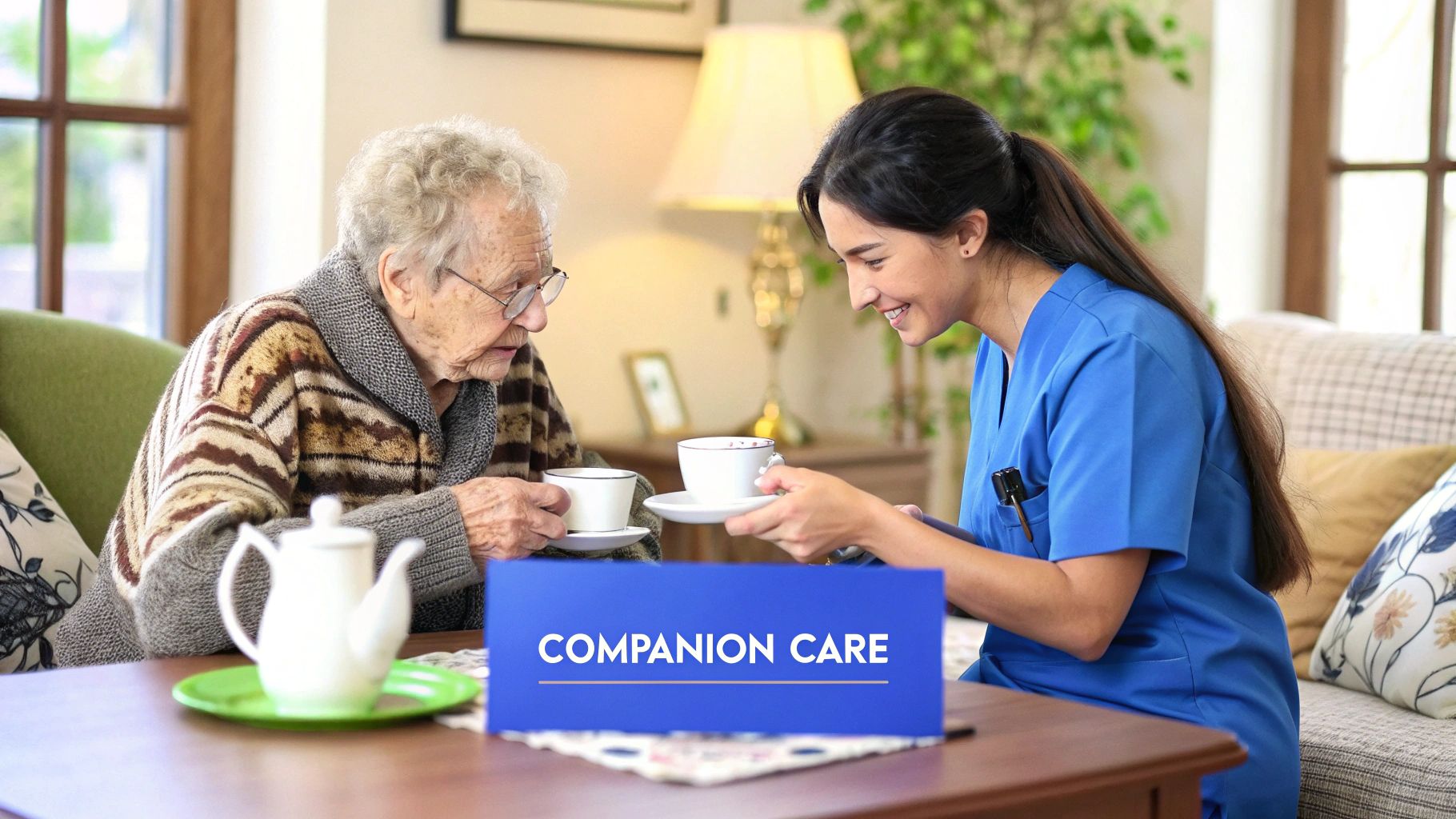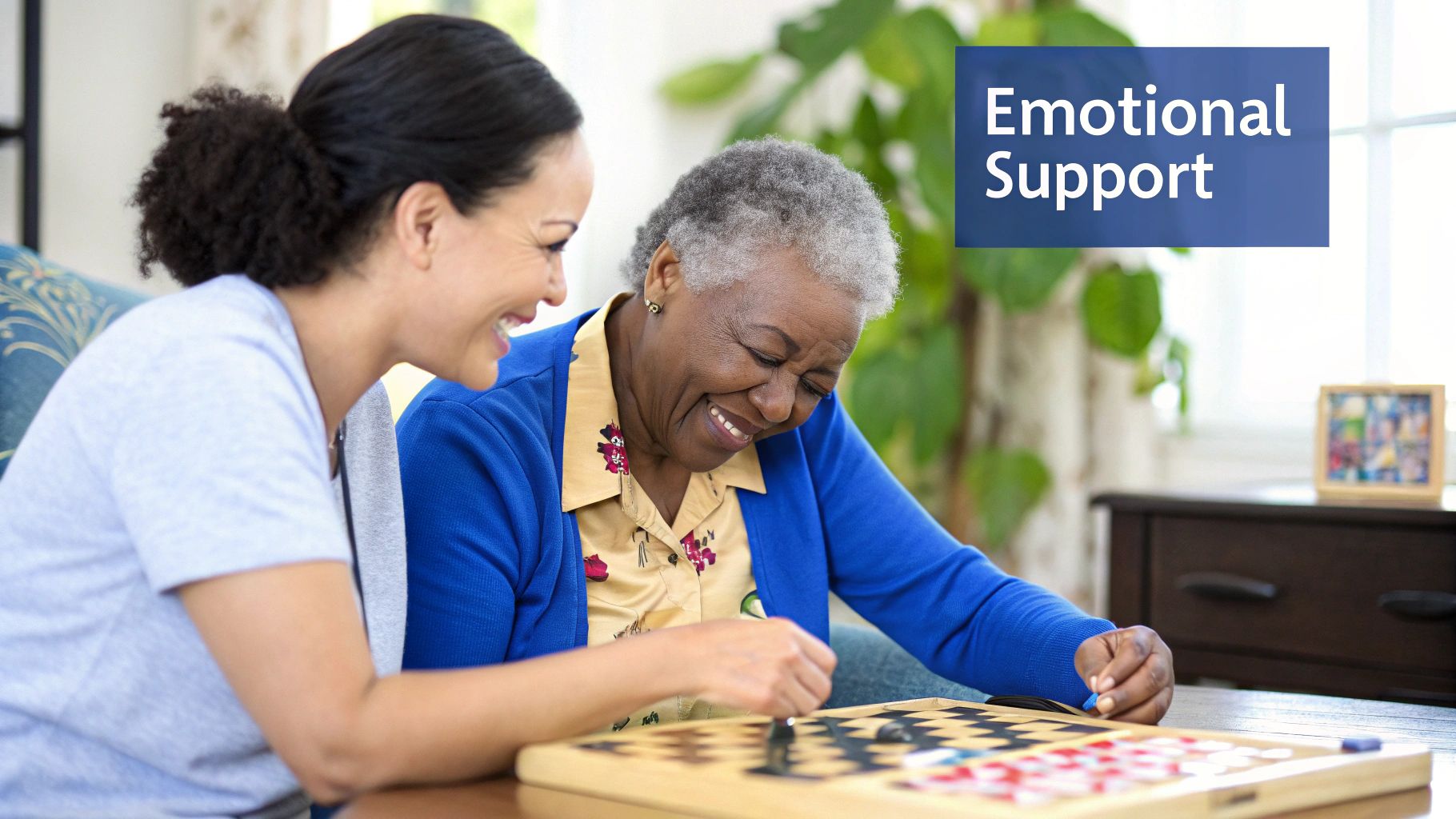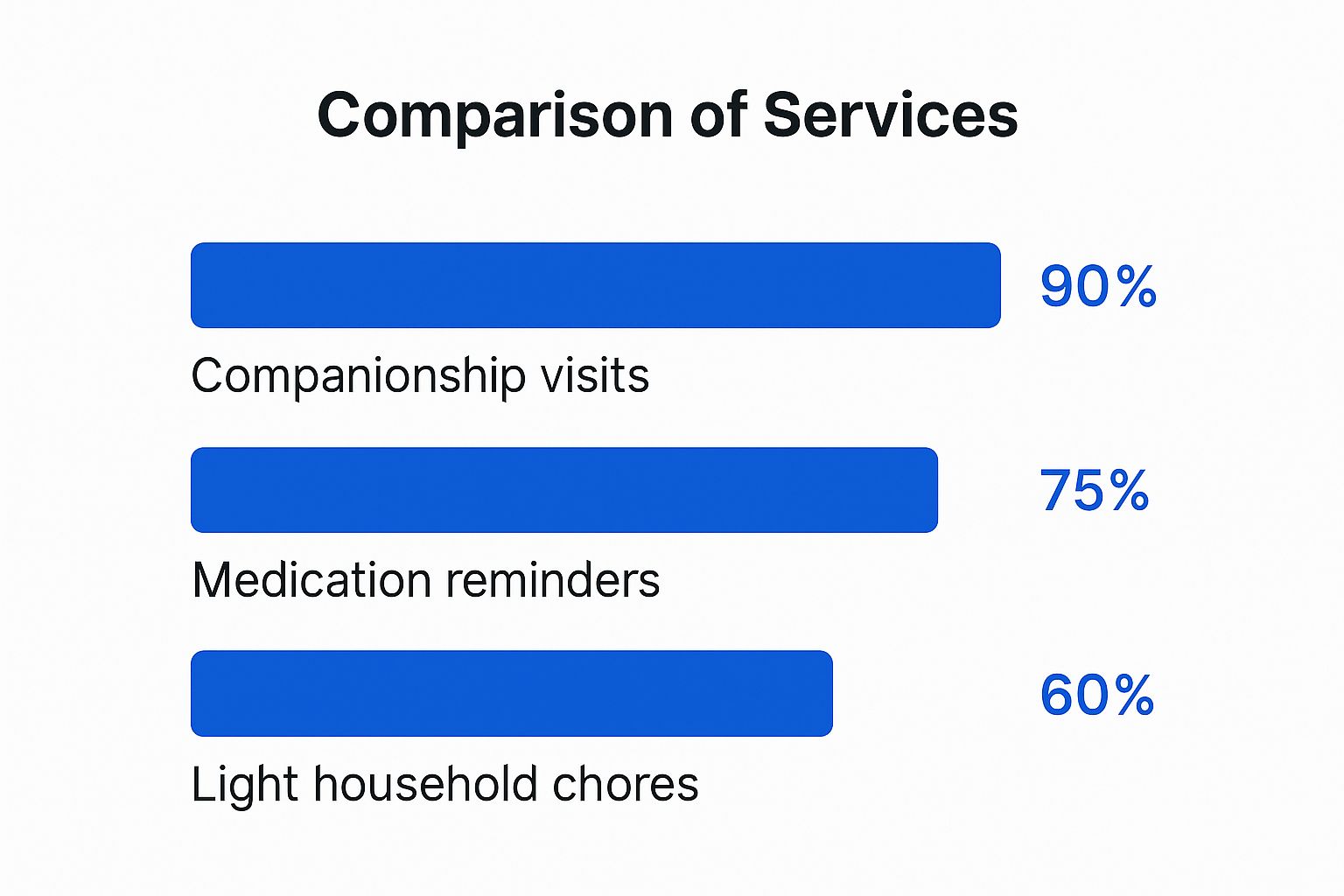When people hear "in-home care," their minds often jump to nurses, medical equipment, and hands-on health assistance. But there's another, equally vital, type of support that focuses less on the body and more on the spirit: companion care.
So, what is companion care, really? In simple terms, it's a form of non-medical, in-home support centered on providing social connection, friendship, and a helping hand with daily life. It’s all about combating loneliness and helping older adults live safely and independently in the comfort of their own homes.
Understanding What Companion Care Really Means

Think of a companion caregiver less like a nurse and more like a trusted friend who stops by regularly. Their main job is to provide company, engage in genuine conversation, and just be a comforting presence. This is what sets it apart from medical home health care, which handles skilled tasks like giving medications or treating wounds.
At its heart, companion care is about enriching a person’s life through connection. Social isolation is a serious health risk for seniors, and a companion acts as a vital bridge to the world, keeping their mind engaged and their spirits lifted. You can get a better sense of this philosophy by looking at our company's mission and values.
The Three Pillars of Support
To really get a feel for how it works, it helps to break companion care down into three core functions. Each one tackles a different aspect of a senior's well-being, and together, they create a safe, supportive, and happy home environment. This structure ensures that both emotional needs and everyday practical challenges are met head-on.
Companion care is built on the simple but powerful idea that no one should have to navigate aging alone. It bridges the gap between total independence and needing intensive medical supervision, offering a solution that prioritizes dignity and quality of life.
Ultimately, this service is about making day-to-day life better through human connection and practical help. Let's explore these pillars a bit more.
Core Pillars of Companion Care at a Glance
This table breaks down the three main functions of a companion caregiver, showing how they blend emotional, practical, and social support into one seamless service.
| Pillar | Description | Examples |
|---|---|---|
| Emotional Support | Providing friendship and a listening ear to combat feelings of loneliness and isolation. | Sharing conversations, playing board games, reminiscing over photo albums. |
| Household Help | Assisting with light, non-medical tasks to maintain a safe and orderly home. | Preparing light meals, tidying up living areas, running errands like grocery shopping. |
| Social Engagement | Encouraging participation in hobbies and community activities to stay active. | Accompanying to social outings, visiting friends, attending community events. |
As you can see, these pillars work together to create a holistic support system that addresses the whole person, not just a set of tasks. It’s a flexible and deeply personal approach to care.
Why More Families Are Choosing Companion Care

The rising popularity of companion care isn’t just a trend; it points to a major shift in how we think about aging. More than ever, older adults are clear about one thing: they want to "age in place." The goal is to stay right where they are, in the comfort and familiarity of their own homes, rather than moving to a facility.
This powerful preference for independence is where companion care finds its purpose. It offers a practical solution that honors a senior's desire to remain at home while making sure they have the social interaction and light assistance they need to live safely and happily. For so many families, it’s the perfect answer.
The Surging Demand for In-Home Support
This isn't happening in a vacuum. As our population ages and people live longer, the need for reliable, non-medical support has skyrocketed. Companion care sits right at the heart of this new reality in modern eldercare.
The numbers don't lie. The global home healthcare market, which includes companion care services, is expected to jump from $416.4 billion in 2024 to a staggering $747.70 billion by 2030. This explosive growth shows just how essential these services have become for families everywhere. You can dive deeper into the data on home healthcare market growth.
For families, this service is more than a convenience—it's a lifeline. It offers peace of mind, knowing a compassionate individual is there to prevent isolation, assist with daily routines, and provide a watchful eye.
At the end of the day, families are turning to companion care because it solves two fundamental needs at once. It respects the senior's wish for a dignified, independent life while giving the family the reliable, compassionate support they need. It’s a solution truly built on connection and respect.
What Does a Companion Actually Do Day-to-Day?
To really wrap your head around what is companion care, it helps to picture what a caregiver does during a typical visit. While every person’s needs are different, the support usually falls into a few key areas—all designed to boost a senior's well-being and help them live independently at home. These are non-medical services focused purely on quality of life.
A huge part of the job is simply being there. A companion offers a friendly face and a listening ear, whether it’s by chatting over a cup of tea, playing a round of cards, or looking through old family photos. This kind of consistent social connection is a powerful antidote to the loneliness that affects nearly one-quarter of adults aged 65 and older.
Fostering Social Connection and Engagement
A companion’s main role is to provide real, meaningful social time. They aren’t just a warm body in the room; they actively share in your loved one’s life.
This could look like:
- Encouraging hobbies they enjoy, like gardening, reading, or knitting.
- Going with them to social outings, like activities at the local senior center, church services, or just visiting with friends.
- Providing a ride to appointments, making sure they never miss a check-up or a chance to get out and about.
This image highlights some of the most common companion care services, showing just how vital these daily interactions are.

As you can see, while the practical help is a big piece of the puzzle, the heart of this service—companionship itself—is what people value most.
Companion Care vs Medical Home Health Care
It’s easy to confuse companion care with medical home health care, but they serve very different purposes. Companion care is all about social and emotional support, while medical home health care involves skilled nursing and therapy ordered by a doctor.
Here's a quick breakdown to clear things up:
| Feature | Companion Care | Medical Home Health Care |
|---|---|---|
| Type of Care | Non-medical, social, and emotional support. | Skilled medical care provided by licensed professionals. |
| Main Goal | Improve quality of life, reduce isolation, and assist with daily living. | Treat illness or injury, manage medical conditions, and provide therapy. |
| Provided By | Companion caregivers (no medical license required). | Registered Nurses (RNs), Physical Therapists (PTs), etc. |
| Common Services | Conversation, errands, light housekeeping, meal prep, transportation. | Wound care, medication administration, physical therapy, vital sign monitoring. |
| Who Orders It? | The individual or their family. | A physician. |
Understanding this distinction is crucial for finding the right kind of support for your family's needs.
Assisting with Household Tasks
Beyond just being a friend, companions also help keep the home environment safe and comfortable by pitching in with light household chores.
A companion helps manage the small but essential daily tasks that can become challenging with age, allowing seniors to conserve their energy for the people and activities they love most.
This practical support might include whipping up nutritious meals, handling a few loads of laundry, tidying up the living room, or running errands like grocery shopping and picking up prescriptions. This kind of help empowers seniors, allowing them to maintain their home and their dignity without getting bogged down by strenuous chores.
The Real Benefits for Seniors and Their Families

While helping with daily tasks is a big part of companion care, its true value runs much deeper. It’s not just about getting chores done; it’s about enriching a person’s life, improving their health, and bringing balance back to the whole family. The real benefits are found in the moments between the tasks.
One of the biggest impacts is on a senior’s mental and emotional health. Social isolation is a quiet but serious threat, often leading to depression, anxiety, and even cognitive decline. A companion provides that consistent, friendly face that breaks the cycle of loneliness. They become a vital link to the outside world.
By providing steady companionship, these caregivers help reduce the risk of depression in older adults, a condition that affects an estimated 15 out of every 100 adults over age 65. Sometimes, the simple act of conversation can make all the difference.
This emotional support creates a positive ripple effect, often sparking a renewed interest in life and even boosting physical health.
Enhanced Safety and Peace of Mind
Simply having another person in the house adds an invaluable layer of safety. A companion can spot potential hazards, like a loose rug that could cause a fall, or notice subtle changes in health that might otherwise go undetected.
This kind of vigilance helps stop small issues from turning into big problems. For family caregivers, this provides priceless peace of mind. Knowing your loved one isn't alone brings a sense of relief that’s hard to overstate, especially when you're juggling work and your own family.
Essential Respite for Family Caregivers
Family caregivers carry an enormous weight, and burnout is a very real danger. Companion care gives them a much-needed chance to step away, rest, and recharge without feeling guilty.
This isn't a luxury; it's essential for making caregiving sustainable in the long run. It allows family members to take care of their own needs, knowing their loved one is in compassionate, capable hands. This support strengthens family bonds and makes the entire caregiving journey more manageable for everyone involved.
How to Find the Right Companion Caregiver
Choosing the right person to spend time with your loved one is a huge decision. You're looking for someone who is not just skilled and trustworthy, but also someone who genuinely clicks with them. A great personality match makes all the difference.
The best way to start is by looking at reputable sources. You can go through local home care agencies, which is often a big help because they handle the background checks, vetting, and scheduling for you. On the other hand, you might find an independent caregiver through an online platform or a trusted referral from a friend. Agencies offer structure, while independent caregivers sometimes provide more flexibility.
Key Questions to Ask Potential Caregivers
Once you have a few candidates, the interview is where you really get a feel for them. This is about more than just their resume; it’s your chance to see if their approach aligns with your family’s values and, most importantly, your loved one’s needs.
Having some questions ready will help you make a confident choice. Here are a few essentials to get the conversation started:
- Background and Safety: "What kind of background checks do you undergo, and how often are they updated?"
- Training and Experience: "Do you have any specialized training or experience with clients who have conditions like memory loss or mobility challenges?"
- Handling Emergencies: "Can you walk me through the steps you would take if a medical or household emergency occurred during a visit?"
- Communication: "How do you typically keep the family updated on my loved one's well-being and daily activities?"
Asking these direct questions right from the start helps make sure everyone is on the same page.
Verifying and Finalizing Your Choice
After the interviews, checking references is an absolute must. Talking to former clients or employers gives you an honest look at a caregiver's reliability, compassion, and professionalism. Don't be shy about asking specific questions about their punctuality or how they’ve managed difficult situations in the past.
The final piece of the puzzle is creating a detailed care plan. This document should clearly outline daily routines, preferences, emergency contacts, and specific tasks. It acts as a roadmap for the caregiver and ensures everyone is on the same page.
Once you’ve found the perfect fit, this care plan ensures things get off to a smooth start. For a deeper look into our commitment to quality care, you can learn more about our company's mission and approach. By taking these steps, you can feel confident you're choosing a companion who will truly enhance your loved one's quality of life.
Exploring Virtual Companion Care Options
As technology weaves its way into every corner of our lives, the very definition of companion care is expanding right along with it. Virtual companion care is a modern answer to an age-old need, using digital tools to offer social connection and support from a distance. Instead of a caregiver walking through the front door, this model relies on technology to keep seniors engaged and connected.
Think of it like this: a friendly face popping up on a tablet for a daily video chat, a smart speaker chiming in with a helpful medication reminder, or an online portal that opens up a world of interactive games and social groups. This evolution of companionship is a game-changer for bridging geographical distances, making it a fantastic option for families who live far apart. It’s a flexible and often more affordable way to check in and make sure a loved one never feels truly alone.
How Virtual Companionship Works
This kind of tech-driven support is a natural fit for seniors who are already comfortable using a tablet or smartphone. It’s also an ideal solution for older adults who don't need hands-on physical help but would absolutely blossom with more regular social interaction.
So, what does this look like in practice? The core services usually include:
- Scheduled Video Calls: Regular, face-to-face conversations provide that consistent social spark and serve as a quick visual wellness check.
- Digital Reminders: Smart devices can be set up to prompt for everything from medication schedules and appointments to simply remembering to drink a glass of water.
- Online Activities: These platforms can connect seniors with virtual book clubs, gentle fitness classes, or brain-training games to keep them sharp and socially active.
This growing field isn't about using technology to replace human connection. It's about making that connection more accessible than ever before, meeting seniors right where they are in an increasingly digital world.
The numbers tell the story. The global virtual companion care market was already valued at around USD 2.8 billion in 2023 and is on track to hit USD 9.5 billion by 2032. You can read the full research about the virtual care market to see the trend. This incredible growth underscores the rising demand for creative, home-based support solutions. While it can't quite replace the warmth of a physical presence, virtual care is a powerful tool for boosting safety and fighting back against isolation.
A Few Common Questions About Companion Care
When you're exploring care options, it’s natural for questions to pop up. Let’s clear up some of the most common ones to give you a better picture of how companion care works and where it fits in.
Companion Care Versus Personal Care
One of the biggest points of confusion is the difference between companion care and personal care. It’s actually pretty simple.
Think of companion care as focusing on quality of life and social well-being. It covers things like conversation, running errands together, light housekeeping, and preparing meals. It's all about friendship and support.
Personal care, on the other hand, involves direct, hands-on help with what we call Activities of Daily Living (ADLs). This includes things like bathing, dressing, grooming, and assistance with mobility. While many home care agencies offer both, they are two very different types of support.
What About Insurance and Medicare Coverage?
This is the big question for many families. Generally, standard Medicare does not cover companion care because these services are considered non-medical.
However, that doesn't mean you're completely out of options. Some other avenues might help with the cost:
- Long-term care insurance policies are a great place to start, as they often include benefits for non-medical in-home support.
- Certain Medicare Advantage (Part C) plans are now offering supplemental benefits that can cover these types of services.
- Veterans might find help through specific VA programs designed to support them at home.
The best first step is always to call your insurance provider directly to see what your specific policy covers.
Ultimately, companion care is typically a private-pay service. But it’s always worth taking the time to explore every possible insurance avenue as you plan for the future. You can get a feel for our approach by viewing our company logo and mission statement.
How Do You Know When It’s Time?
There’s no magic formula, but the signs are often clear once you know what to look for. You might notice a parent or loved one is experiencing more loneliness, or maybe the housekeeping has started to slide. Other common indicators include missed appointments or a fading interest in their favorite hobbies.
It's also a crucial lifeline for family caregivers who are starting to feel stretched thin. If you're feeling overwhelmed, bringing in a companion caregiver can provide that much-needed respite and prevent burnout.
At NJ Caregiving, we believe that aging should be a journey of dignity and connection, not isolation. If you’re looking into care options for a loved one in Princeton or anywhere in Mercer County, we’re here to help. Discover more about our compassionate, personalized approach to in-home care at https://njcaregiving.com.


